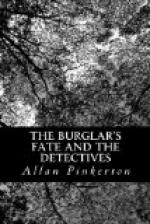When the judge had taken his seat, and the door opened to admit the four youthful prisoners, all eyes were turned upon them. Slowly and with downcast eyes they entered the chamber of justice, and amid an awe-like stillness that pervaded the room, took their seats in the prisoners’ dock. In spite of all that had transpired, and with the full conviction that these youthful offenders richly merited whatever judgment they were to receive, there was not one in that entire audience, whose heart did not throb with sympathy for the aged parents and relatives of the accused, and even for the culprits themselves in this, the dreadful hour of their humiliation and grief.
The trial was not a protracted one. A jury was speedily empaneled, the low, stern tones of the judge were heard in timely admonition, and the prosecution was commenced. Upon the prisoners being asked to plead to the indictments which had been prepared against them, Mr. Kirkman, a prominent attorney of Geneva, who had been retained to defend the unfortunate young men, arose, and in impressive tones entered a plea of guilty. With the keen perceptions of a true lawyer, he felt that the proofs were too strong to be overcome, and that to attempt to set up any technical defense would only result in greater hardships to his clients. He, however, made an eloquent and touching appeal for the exercise of judicial clemency. He referred in feeling terms to the youth of the prisoners, to the groups of weeping and stricken relatives, whose prayerful hearts were echoing his appeals. He urged that the evidences of sincere repentance had been manifested by all of the prisoners, and that, as this had been their first offense, the exercise of gentle mercy would be both grand and productive of good results.
His words were not lost even upon the prosecuting attorney, and when Mr. Kirkman had concluded, that gentleman arose, and in a few words echoed the sentiments of the attorney for the defense. He also expressed the conviction that, while justice called loudly for sentence, yet there were elements in this case in which the wisest judgment would be that which partook of the qualities of mercy.
At the conclusion of this request, the judge, with a delicate regard for the tender feelings of the assembled relatives, ordered an adjournment of the court, in order that he might take the merits of the case under advisement, and to enable him to administer such sentence, as, in his best judgment, was demanded under the circumstances. Slowly the immense audience dispersed, and for a few moments the prisoners were allowed to converse with their weeping friends, after which they were again conducted to their cells to await the action of the court.
A few days later they were brought quietly before the judge and their sentences were pronounced. Dr. Johnson, owing to the existence of a doubt as to his complicity in the robbery, was condemned to four years’ imprisonment on the charge of forgery, while Newton Edwards, Eugene Pearson, and Thomas Duncan were each sentenced to an imprisonment of six years on the indictment for burglary.




